Read Time: 6 Minutes Subscribe & Share
Win-Win
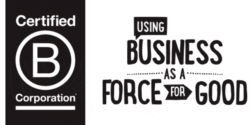 It was supposed to be a good deal, and for a while it was. Around two decades ago, various groups of small dairy farmers, who were following the original intent of organic certification, had the opportunity to sell their milk to Horizon Organic and Stonyfield Farms brand (now owned by Danone North America.) They had to go through a passel of time-consuming audits and, in some cases, farmers had to limit the dairy products they could sell independently. Their milk-producing animals were fed according to the original tenets of organic certification in the US. That meant they ranged in pastures and fed on the grasses of the farm, supplemented by
It was supposed to be a good deal, and for a while it was. Around two decades ago, various groups of small dairy farmers, who were following the original intent of organic certification, had the opportunity to sell their milk to Horizon Organic and Stonyfield Farms brand (now owned by Danone North America.) They had to go through a passel of time-consuming audits and, in some cases, farmers had to limit the dairy products they could sell independently. Their milk-producing animals were fed according to the original tenets of organic certification in the US. That meant they ranged in pastures and fed on the grasses of the farm, supplemented by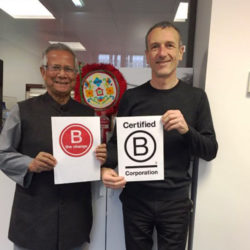 certified organic feed in the winter when necessary. Conventional dairy farmers began to explore the organic milk market, because they could get a higher price for organic milk with fewer cows. Happy cows. Happy, healthy consumers. Well-compensated farmers. According to The Real Ogranic Project, Danone – a French-based multinational corporation – purchased Whitewave Foods, which owns Horizon Organic, the biggest organic dairy company in the world. This purchase and merger was renamed Danone North America. Under the leadership of the then-CEO Emmanuel Faber, Danone earned the coveted title of being a B Corporation, like Patagonia, based on its achievement of meeting “the highest standards of verified social and environmental performance, public transparency, and legal accountability to balance profit and purpose”. Emmanuel Faber was considered a visionary CEO and Danone was the largest corporation under the B Corp mantle. Their profits had a 5% increase earlier this year. Faber was an acknowledged saint among socially conscientious CEOs. Until – wait for it – Citing poor stock performance, major shareholding groups ousted Faber as CEO in March, 2021.
certified organic feed in the winter when necessary. Conventional dairy farmers began to explore the organic milk market, because they could get a higher price for organic milk with fewer cows. Happy cows. Happy, healthy consumers. Well-compensated farmers. According to The Real Ogranic Project, Danone – a French-based multinational corporation – purchased Whitewave Foods, which owns Horizon Organic, the biggest organic dairy company in the world. This purchase and merger was renamed Danone North America. Under the leadership of the then-CEO Emmanuel Faber, Danone earned the coveted title of being a B Corporation, like Patagonia, based on its achievement of meeting “the highest standards of verified social and environmental performance, public transparency, and legal accountability to balance profit and purpose”. Emmanuel Faber was considered a visionary CEO and Danone was the largest corporation under the B Corp mantle. Their profits had a 5% increase earlier this year. Faber was an acknowledged saint among socially conscientious CEOs. Until – wait for it – Citing poor stock performance, major shareholding groups ousted Faber as CEO in March, 2021.
Win-Lose
Branded organic foods (whose independent organic certifications are increasing due to the loosening of US organic standards) have shown some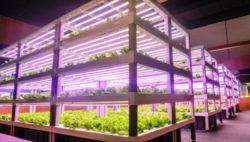 impressive growth numbers. No wonder hydroponic food growers want to use the term “organic” with their products – which are soilless and are fed through a water-based nutrient system. Consumers who want to buy healthier food products, shaped by their confidence in organic branding or certification, have actually made the organic market a massive financial success. Large food corporations have noticed. They have used their financial power and lobbying chops to loosen what “organic certification” means. And they use the looser regulations to create lower pricing for a particular commodity. With this ploy, they have created gluts in “organic” milk production to force the lowering of its wholesale price. This in turn makes it impossible for small organic producers to be price-competitive on milk production and delivery. After requiring its producers to complete the usual arduous audits required to qualify as suppliers (a far heavier lift for small producers), Danone shortly after gave out a sheaf of pink slips.
impressive growth numbers. No wonder hydroponic food growers want to use the term “organic” with their products – which are soilless and are fed through a water-based nutrient system. Consumers who want to buy healthier food products, shaped by their confidence in organic branding or certification, have actually made the organic market a massive financial success. Large food corporations have noticed. They have used their financial power and lobbying chops to loosen what “organic certification” means. And they use the looser regulations to create lower pricing for a particular commodity. With this ploy, they have created gluts in “organic” milk production to force the lowering of its wholesale price. This in turn makes it impossible for small organic producers to be price-competitive on milk production and delivery. After requiring its producers to complete the usual arduous audits required to qualify as suppliers (a far heavier lift for small producers), Danone shortly after gave out a sheaf of pink slips.
An announcement was made by Danone North America that, as of August 2022, 89 of its smaller dairy supplying farms in Maine, New Hampshire, and Vermont, as well as parts of New York, will be cut off their list of suppliers. Organic dairy farmers in Wisconsin, a traditional dairy star in the US, will soon face the same termination. Danone made this announcement in traditional corporate speak, using such phrases as “Growing transportation and operational challenges in the dairy industry, particularly in the Northeast, led to this difficult decision…We will be supporting new partners that better align with our manufacturing footprint.” Nicole Dehne, director of Vermont Organic Farmers, states that “real organic farmers are required to manage their farms so they’re hospitable to the local ecosystem. They have to improve soil health on their farms. They have to plan and manage for biodiversity.” Such stringent rules just didn’t add up to big enough profits for Danone it seems. Yet, for many consumers, organic still meant the lovely things it had always meant. Except it didn’t.
Your Fauxganic Partner
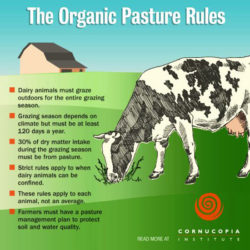 The acronym CAFO (Concentrated Animal Feeding Operation) is the industrial-scale farming standard. While it might appear somewhat spotless on paper, it is unsustainable for the future and creates horrific conditions that should shock any viewer. In no way is it beholden to organic founding principles. CAFOs are primarily found in western states, such as Colorado, Arizona, and Texas and supply a large percentage of the conventional meat and dairy available to the consumer in the US. At the organic end of the spectrum, the Pasture Rule for dairy animals requires a minimum of 120 days in pasture (and most real oranic farmers have their dairy cattle on pasture for more than 120 days); and about a third of the animals’ nutrition must come from “dry matter intake” from organic pasture grazing. In the increasingly arid west, herds numbering in the thousands of dairy cows are penned and allowed out in pasturage in name only. A farmer wrote to the journal In These Times.
The acronym CAFO (Concentrated Animal Feeding Operation) is the industrial-scale farming standard. While it might appear somewhat spotless on paper, it is unsustainable for the future and creates horrific conditions that should shock any viewer. In no way is it beholden to organic founding principles. CAFOs are primarily found in western states, such as Colorado, Arizona, and Texas and supply a large percentage of the conventional meat and dairy available to the consumer in the US. At the organic end of the spectrum, the Pasture Rule for dairy animals requires a minimum of 120 days in pasture (and most real oranic farmers have their dairy cattle on pasture for more than 120 days); and about a third of the animals’ nutrition must come from “dry matter intake” from organic pasture grazing. In the increasingly arid west, herds numbering in the thousands of dairy cows are penned and allowed out in pasturage in name only. A farmer wrote to the journal In These Times.
Having raised cattle on pasture all my life, I am always at a loss to understand how 15,000 cows could be moved to and from pasture between milkings. Cows move slowly and 15,000 would require hundreds of acres of grass per day — that is a long walk. Impossible.
So, no way these big operations can be meeting what had long been organic standards — the obvious solution was for the big guys to lower those hard-to-meet criteria.
Money Talks
Having procured much looser interpretations of USDA organic rules, CAFOs continue to grow to the point that “about half of the organic milk sold in the United States is coming from very large factory farms that have no intention of living up to organic principles,” according to Mark Kastel, co-director of the nonprofit Cornucopia Institute. Nutritionally in tests, this “fauxganic” milk tested similarly to conventional milk in terms of lack of nutrients. A Washington Post investigative report in 2017 and accompanying video make this charade quite clear. It’s also somewhat eyebrow-raising to find out that, while we sell our conventional grain globally, there is not enough certified organic grain to export. So if these ruminant animals are not getting real pasture time on organically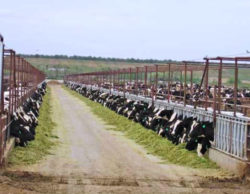 certified fields, what are they being fed? Interesting to note that, in order to get around this issue, these CAFO dairy farms are importing feed that is labeled organic from Turkey, Ukraine and Argentina, according to an article in The Cornucopia Institute. But that math doesn’t work either. Call me a cynic, but I begin to doubt the imports’ organic credentials when the supposed organic grain from these countries often exceeds their actual certified grain output. One begins to suspect some falsified organic labeling.
certified fields, what are they being fed? Interesting to note that, in order to get around this issue, these CAFO dairy farms are importing feed that is labeled organic from Turkey, Ukraine and Argentina, according to an article in The Cornucopia Institute. But that math doesn’t work either. Call me a cynic, but I begin to doubt the imports’ organic credentials when the supposed organic grain from these countries often exceeds their actual certified grain output. One begins to suspect some falsified organic labeling.
As consumers, we do have a voice, by choosing how we purchase our food. Basically, we once again have corporations undercutting or ignoring the rules of the US Organic Production Act of 1990 which should have criminal implications or at least hefty fines. Independent family farms that are committed to sustainable and organic agriculture provide a true product but are unable to compete and will be forced to sell out in a rigged marketplace, or, in the case of the independent farmers who are joining such syndicates as The Real Organic Project, develop their own markets. The Milkhouse Dairy and Creamery is one of a growing number of members in this new organization. I for one, am determined to help them fight back.
Know Your Farmer | Milkhouse Farm Maine | Real Organic Project
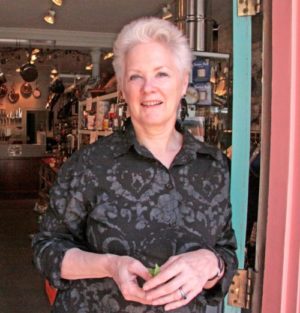
Kitchen Detail shares under the radar recipes, explores the art of cooking, the stories behind food, and the tools that bring it all together, while uncovering the social, political, and environmental truths that shape our culinary world.

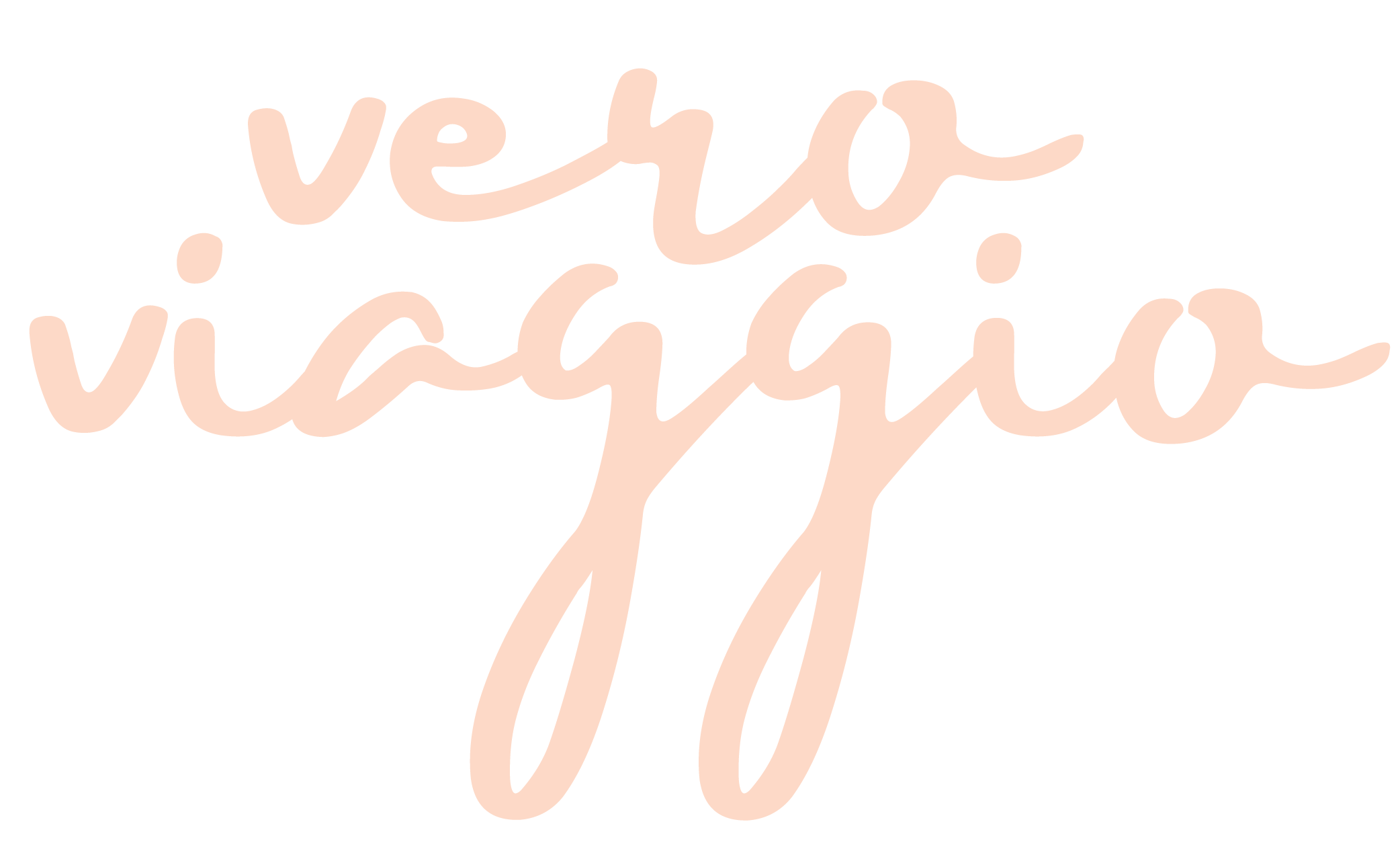



Very interesting article, Nancy. Thank you!
Hi Jaime,
This subject is so vast that it is hard to break down into smaller bits. Glad that you liked this post.
Nancy
It’s just so depressing. I try to be a conscientious buyer but it’s so hard to know who owns what and what they’re doing behind the scenes. I shop Mom’s hoping they’re doing some of that legwork but looks like I may have to figure out something else.
Hi Jennifer,
We shop at MOMs too. I think they certainly walk the walk and not just talk the talk. But the issue is so vast, it is truly impossible for a small chain to do the legwork we consumers want. They carry other brands which do uphold a higher standard.
Nancy
Nancy, many thanks for always digging for the truth when it come to our food. I’m appalled, but not surprised. I’ll do my part to put wholesome food on our table, and that includes true organic dairy.
HI Janet,
Yes, I was appalled but not surprised too. And there are other brands that look similar but maintain a more ethical standard. I am jusst beginning to learn about them and also looking at the other organic branding that is done by independent groups.
Nancy
This article is dispiriting but not surprising. I wonder if Organic Valley, illustrated but not mentioned in your post, is still operating under true organic laws or if it’s gone to the dark side also. An article on local organic creameries would be a real help. Thanks for your diligence.
Hello Kathy,
Organic Valley is not part of the Danone North America group…to my knowledge. It is hard to keep up with the corporate takeovers and the subsequent diluting of the organic intent. Yes, I will do more articles on this subject. I was thinking about it when I was researching this one.
Nancy